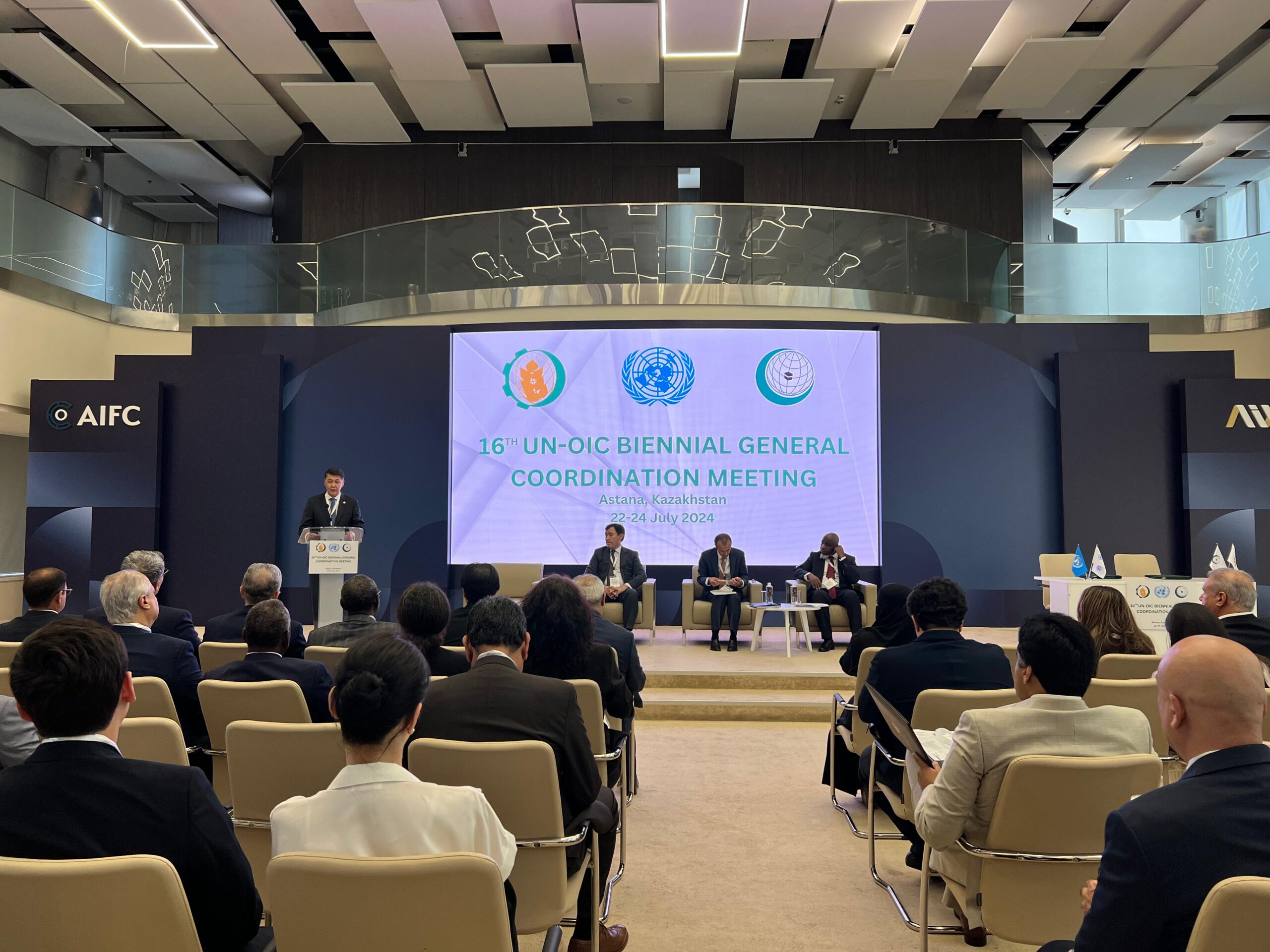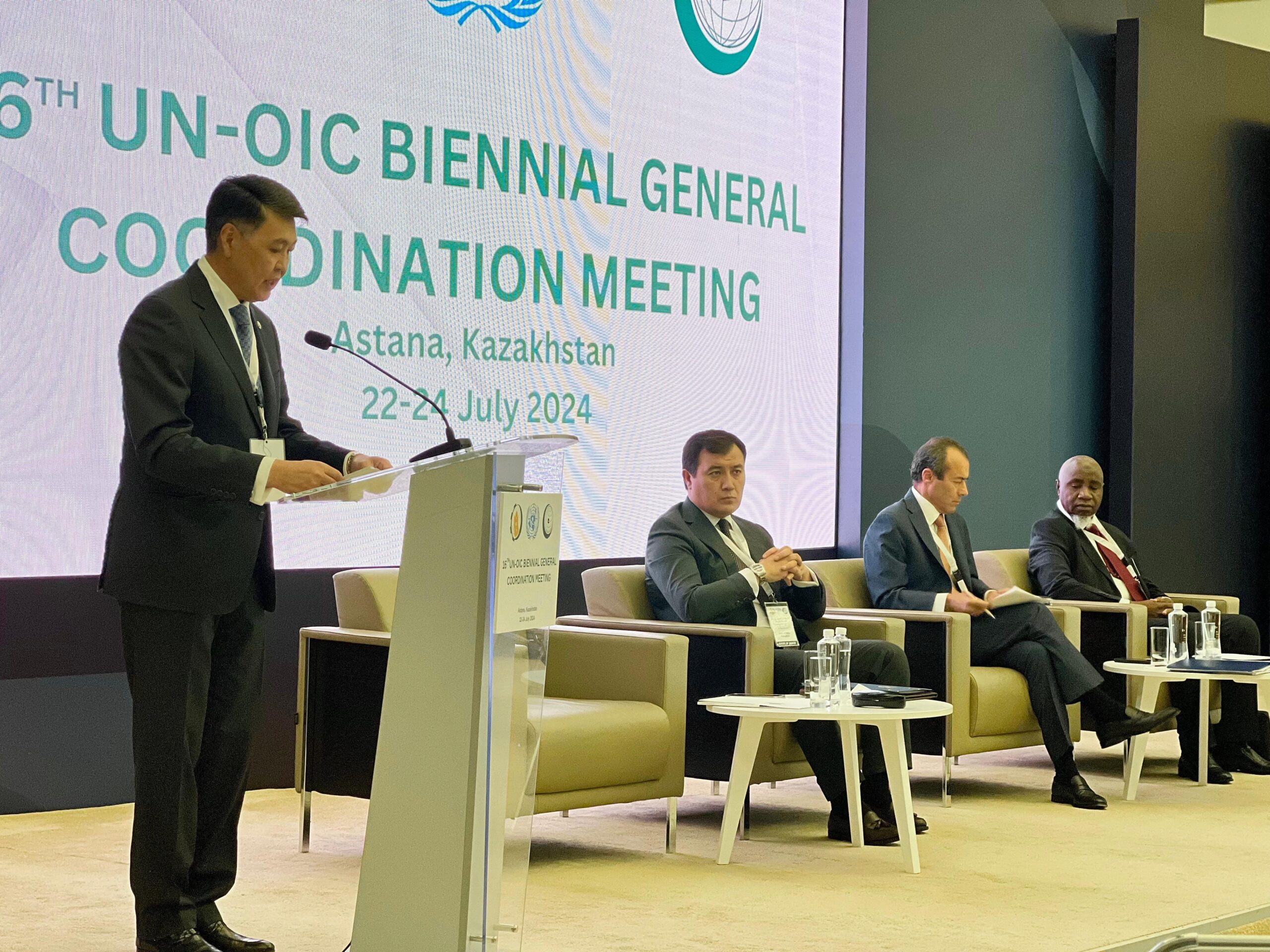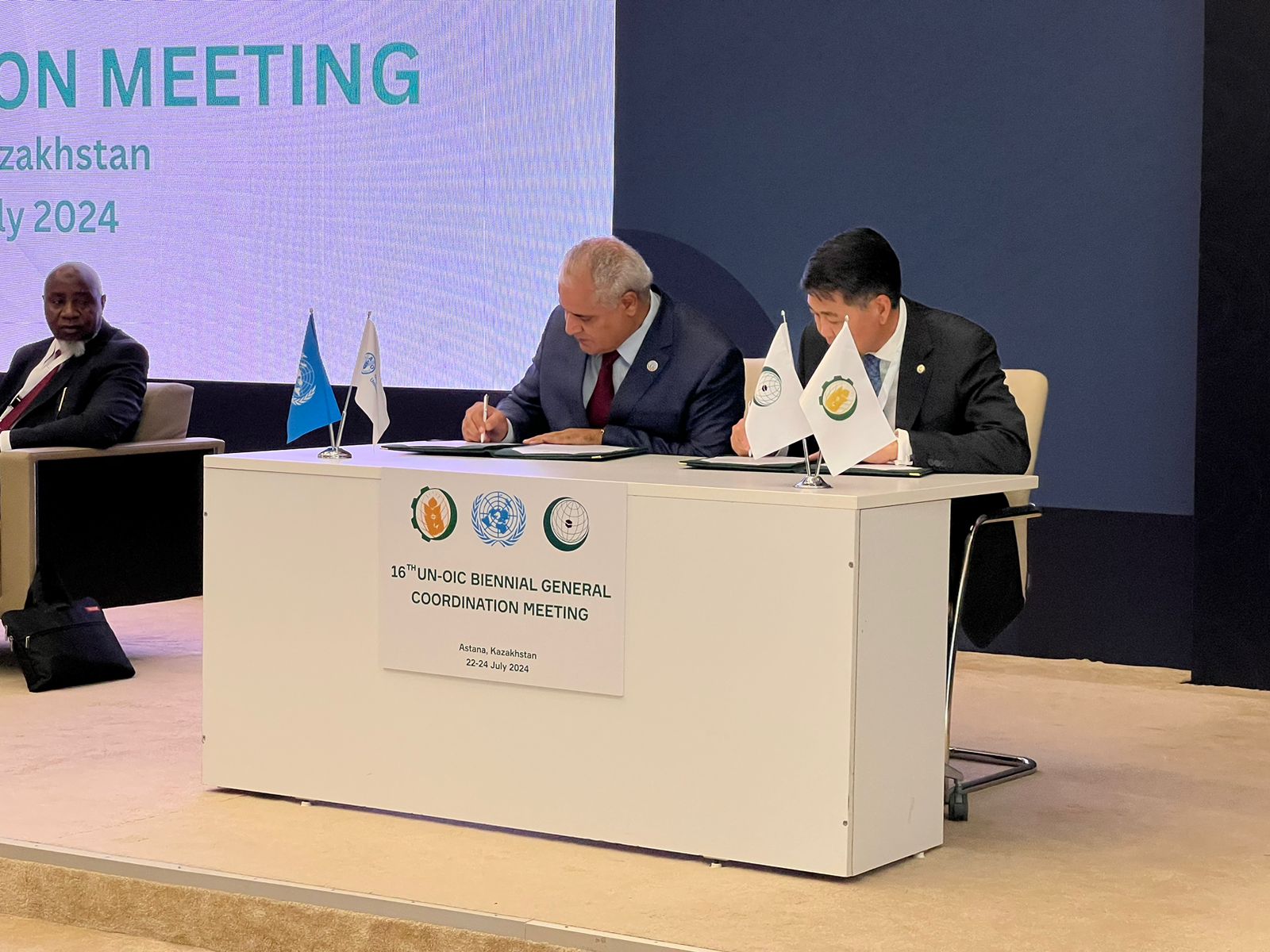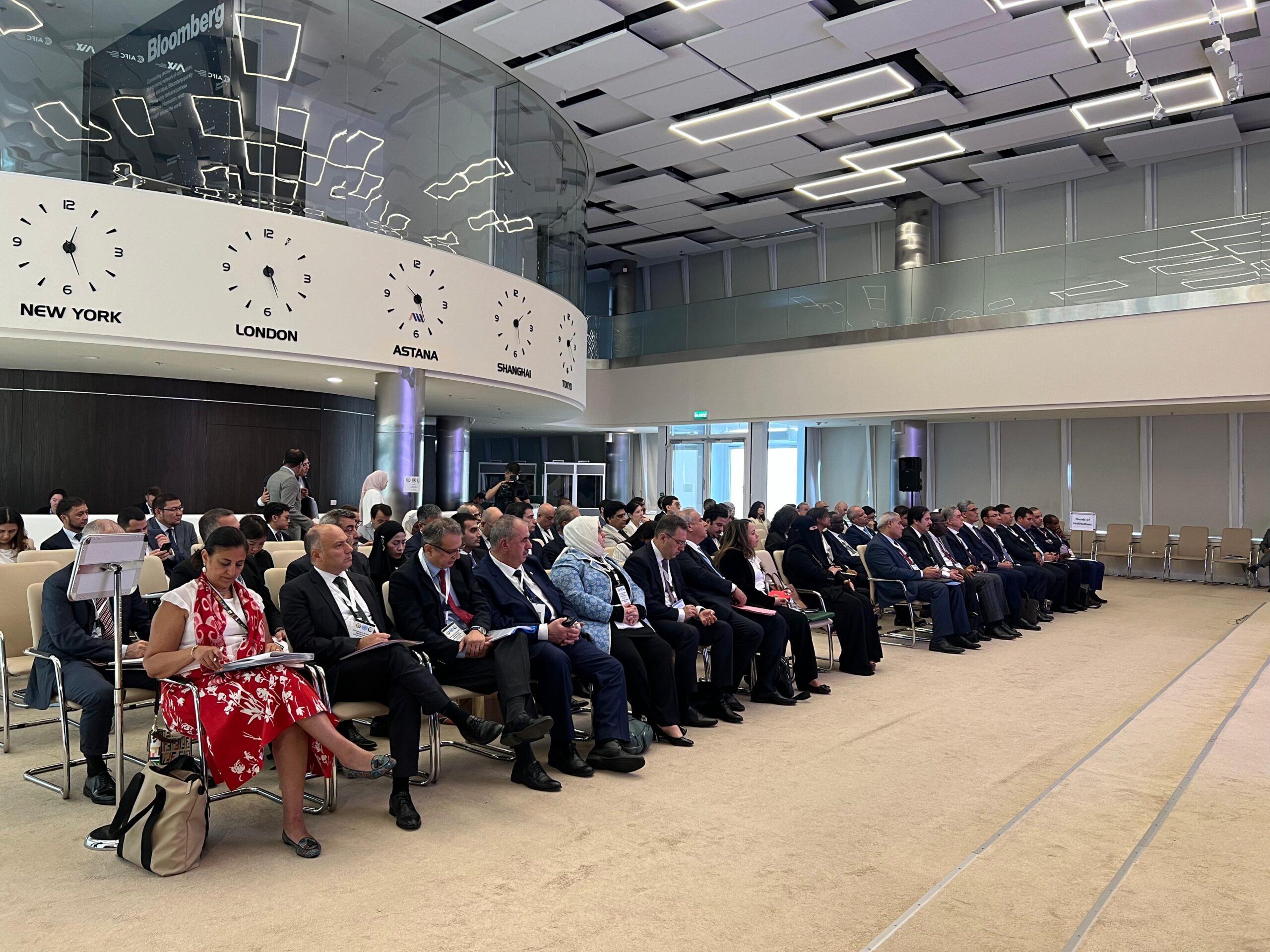ASTANA—Representatives of the United Nations (UN) agencies and the Organization of Islamic Cooperation (OIC) gathered on July 22-24 in Astana for the 16th Biennial General Cooperation Meeting. The meeting, hosted by the Islamic Organization for Food Security (IOFS), aims to enhance cooperation between two international organizations in the face of rising global challenges.

OIC has 57 member states spread over four continents. Photo credit: Aida Dosbergenova/ The Astana Times
The coordination meetings are held once in two years to promote cooperation between OIC institutions and UN agencies. The latest was held in July 2022 in Geneva and concluded with the adoption of a Matrix of Joint Activities between the OIC and the UN, including the realization of the OIC-2025: Program of Action and the UN 2030 Agenda for Sustainable Development, for the next biennium.
The three-day event in Astana will feature discussions among working groups on key thematic areas – political issues, economic and scientific issues, and cultural, social and humanitarian issues.
At the opening ceremony, IOFS and the UN’s Food and Agriculture Organization (FAO) signed a letter of intent, which will foster institutional cooperation between the two institutions in member states including Afghanistan, Chad, Djibouti, Gambia, Kazakhstan, Mauritania, Nigeria, Somalia, and Tajikistan.

Berik Aryn addresses the gathering. Photo credit: Aida Dosbergenova/ The Astana Times
“This gathering marks a significant milestone in our collective efforts to enhance cooperation and coordination between the United Nations and the Organization of Islamic Cooperation,” said Berik Aryn, a Kazakh diplomat and Director General of IOFS, a 41-member organization initiated by Kazakhstan. He sees the meeting is a good opportunity to reflect on the progress made over two years.
Enhanced collaboration
Aryn presented four proposals to enhance collaboration between OIC and UN. First is to align strategic documents and action plans of institutions working in similar areas to avoid duplication and financial resource dispersion.
“Such work should take into account cross-cutting issues, as, for example, is the case of food security, which may be addressed from different angles, including climate change, water, safety, and humanitarian assistance,” he added.
He also suggested establishing a permanent UN-OIC joint task force, convening intercessional thematic working group meetings, and establishing online integrated data and information-sharing systems to enhance transparency, coordination, and evidence-based decision-making.

FAO Assistant Director General AbdulHakim Elwaer and Berik Aryn sign a letter of intent. Photo credit: Aida Dosbergenova/ The Astana Times
Aryn also mentioned IOFS’ humanitarian initiatives in partnership with UN agencies. These include the Afghanistan Food Security Program and cooperation with the UN Relief and Works Agency for Palestine Refugees (UNRWA).
Kazakhstan’s staunch stance on multilateralism
Kazakh Deputy Foreign Minister Alibek Bakayev said the meeting underscores a collective dedication to fostering peace, stability, and prosperity across the globe.
“Kazakhstan has always been a staunch advocate for multilateralism and international cooperation We sincerely believe that the challenges facing our world today, such as conflicts, terrorism, climate change, and economic inequality, demand a united and comprehensive response,” said Bakayev, addressing the gathering on behalf of Deputy Prime Minister – Foreign Minister Murat Nurtleu.
Bakayev mentioned the recent visit of UN Secretary-General Antonio Guterres to Kazakhstan as an “exemplary instance” of the country’s successful collaboration with the UN.
“The UN Secretary-General commended Kazakhstan’s efforts in promoting nuclear disarmament and nonproliferation, acknowledging our country’s strategic role in these crucial areas,” said Bakayev.

The coordination meetings are held once in two years to promote cooperation between OIC institutions and UN agencies. Photo credit: Aida Dosbergenova / The Astana Times
He noted that the UN Regional Center in Almaty is active and serves as a central link for coordinating the UN’s activities throughout Central Asia. He reaffirmed Kazakhstan’s continuous support of UN activities, highlighting the ultimate goal of institutionalizing this center as the UN Regional Center for Sustainable Development for Central Asia and Afghanistan.
He also underlined Kazakhstan’s thriving cooperation with the OIC. The nation launched the OIC-15 Dialogue Platform initiative, which aims to unite 15 leading Muslim countries in the field of science and technology. Its first ministerial meeting took place in Almaty in May 2023.
“This initiative seeks to foster innovation, enhance scientific research, and drive technological advancements in OIC member states,” said Bakayev.
Bakayev commended the UN and OIC’s efforts to mitigate conflicts and provide humanitarian assistance to those affected by violence. “We stand ready to contribute to these noble efforts through our expertise and resources,” he added.
He also emphasized that when joining hands, the UN and OIC can do more to promote economic development and advocate for human rights, particularly those of women and children.
Ongoing conflicts
Addressing the event, Khaled Khiari, assistant secretary-general for the Middle East and Asia Pacific at the UN, stressed the “deeper political dialogue” between UN and OIC in recent years.
He noted the sides worked together on electoral assistance via joint electoral training initiatives and senior staff exchange programs, preventing violent extremism through the UN Office of Counter-Terrorism, combating Islamophobia, and capacity-building initiatives.
“As we meet now, the horrors of the war in Gaza continue to rage on. The OIC and the United Nations have consistently called for ending the unbearable suffering of the Palestinian people in Gaza. I strongly reiterate the Secretary-General’s call for Israel and Hamas leaderships to urgently agree to an immediate humanitarian ceasefire in Gaza and the release of hostages. UNRWA remains the backbone of our operations there and a lifeline for Palestine refugees across the region. It needs full support and funding,” he said.
He also noted many other conflicts ongoing in different parts of the world that require immediate support from the international community.
“I commend the vital role of the OIC in supporting the people of Afghanistan through constructive engagement, especially when it comes to the rights of women and girls. In Sudan, the fighting has persisted for more than a year and created untold devastation. The warring parties must silence the guns, for the sake of the Sudanese people and their peaceful future. In Myanmar, the Rohingya continue to face life-threatening violations in the absence of protective and accountability measures,” said Khiari.
